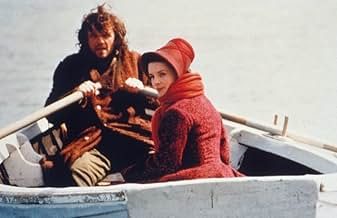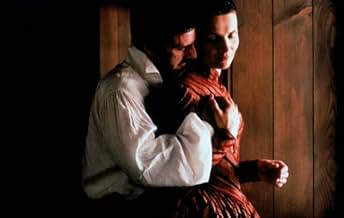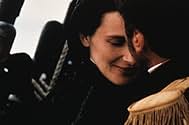PUNTUACIÓN EN IMDb
7,1/10
5,8 mil
TU PUNTUACIÓN
Añade un argumento en tu idiomaIn a small French colony, a drunken man kills someone. While a guillotine is being shipped in, he changes, becoming a good and popular man.In a small French colony, a drunken man kills someone. While a guillotine is being shipped in, he changes, becoming a good and popular man.In a small French colony, a drunken man kills someone. While a guillotine is being shipped in, he changes, becoming a good and popular man.
- Premios
- 3 premios y 9 nominaciones en total
Argumento
¿Sabías que...?
- CuriosidadesThe film was to be completely filmed on the island of Saint-Pierre, but when the snow failed to arrive, the production had to move further north to Newfoundland for certain sequences.
- PifiasWhen Neel is told he's strong enough to "ramer jusqu'au chez les Anglais", the English subtitles say "row over to Canada" rather than "row over to the English". This introduces an error: both the geography and the dialogue in other scenes make it clear that Newfoundland is meant, but Newfoundland wasn't part of Canada until 1949.
- ConexionesFeatured in The 58th Annual Golden Globe Awards 2001 (2001)
Reseña destacada
I have always been a Patrice Leconte devotee. His career in which incoherence and eclecticism get on well together (perhaps that's why he's often slated by French critics) is one of the most fruitful you could dream of, even if French mainstream public often associates his name with "les Bronzés" (1978), a commercial hit which put him on the map as well as the actors, the famous troupe of the Splendid and tends to overshadow the rest of his prolific career which spawned treasures like "Tandem" (1987), "Monsieur Hire" (1989) or "Le Mari De la Coiffeuse" (1990).
This vehicle "La Veuve De Saint Pierre" (2000) was originally to be directed by another veteran of French cinema Alain Corneau (who sadly shot the insipid "Prince Du Pacifique" that year, perhaps the nadir of his career) but he turned down the role due to disputes with the producers. So, Patrice Leconte inherited the project. His choice was motivated by the desire to work with one of the two main roles, Juliette Binoche (he had teamed up with Daniel Auteuil the previous year for "La Fille Sur Le Pont, 1999)
The title of the film has a double meaning: the "veuve" refers to Binoche after her husband's demise. The opening sequence presents her to us in her mourning garb (Leconte's work is served by lavish costumes). The audience knows that she is the "veuve" and will discover in the long flashback, how she has lost her husband. But a "veuve" is also a slang word for the sinister guillotine and it has a tongue-in-cheek connotation: Saint Pierre unlike France hasn't got a death instrument and must have one. All the time, the island is deprived of a guillotine, it remains a "veuve".
There are clearly two sides. On the one hand, the officers' who govern the island and are die-hards of the death sentence and on the other hand, the private triangle which encompasses Auteuil, Binoche and Kusturica. Between the two poles, the impending threat of the execution with the recurring images of the ship sailing across the Atlantic with on board the guillotine. The scenario eschews the tempting trap of the Manicheism and the officers aren't caricatures. As a matter of fact, one of the main thrusts of the film is to deride the leaders of the island who seek at all costs to keep the death sentence and their obstinacy is made ludicrous by the postpone of the sentence and the last words of the voice over contain grim details which give a slap to one of Doctor Guillotin's famous words: "a painless death is a progress for humanity". Moreover, they prove to be unscrupulous because when a new inhabitant settles on the island, they entrust him the role of the executioner without taking care of his opinion.
In the private triangle, madame La by guiding Neel on the way of redemption is full of condescension and solicitude but she's a complex character. Her reasons and motivations to redeem Neel are rather elusive even if she says (I don't remember the accurate cue): "I think human soul is unpredictable and can be able to become conscientious and intelligent. A little gratifying cue which should have been more construed and fleshed out and remains an inkling. Then, why would she encourage the sacrifice of such a devoted husband to try to save a convicted killer whereas it's doomed to failure? Is it a response to her husband's love? (If Auteuil sacrifices himself it's for love for his wife and respect for Neel). Certainly and if so, Leconte's piece of work is a novel and quirky approach on the relationship between husband and wife, a quite notable feat for an author who has seldom studied this topic in his filmography, except maybe in "Le Mari De La Coiffeuse".
Buoyed by a more than palatable cast with a special mention to Emir Kusturica who was a discerning choice because he could convey vulnerability and fragility to his persona of great strapping man, "La Veuve De Saint Pierre" may be derivative if we consider the theme of redemption and the thrust quoted in the fourth paragraph but its treatment is a far cry from Hollywood's formulaic conventions. How to rank it in Leconte's uneven but usually riveting filmography? It isn't on a par with his towering achievements but stands out as a more than palatable flick which however could have gained by being more deepened.
This vehicle "La Veuve De Saint Pierre" (2000) was originally to be directed by another veteran of French cinema Alain Corneau (who sadly shot the insipid "Prince Du Pacifique" that year, perhaps the nadir of his career) but he turned down the role due to disputes with the producers. So, Patrice Leconte inherited the project. His choice was motivated by the desire to work with one of the two main roles, Juliette Binoche (he had teamed up with Daniel Auteuil the previous year for "La Fille Sur Le Pont, 1999)
The title of the film has a double meaning: the "veuve" refers to Binoche after her husband's demise. The opening sequence presents her to us in her mourning garb (Leconte's work is served by lavish costumes). The audience knows that she is the "veuve" and will discover in the long flashback, how she has lost her husband. But a "veuve" is also a slang word for the sinister guillotine and it has a tongue-in-cheek connotation: Saint Pierre unlike France hasn't got a death instrument and must have one. All the time, the island is deprived of a guillotine, it remains a "veuve".
There are clearly two sides. On the one hand, the officers' who govern the island and are die-hards of the death sentence and on the other hand, the private triangle which encompasses Auteuil, Binoche and Kusturica. Between the two poles, the impending threat of the execution with the recurring images of the ship sailing across the Atlantic with on board the guillotine. The scenario eschews the tempting trap of the Manicheism and the officers aren't caricatures. As a matter of fact, one of the main thrusts of the film is to deride the leaders of the island who seek at all costs to keep the death sentence and their obstinacy is made ludicrous by the postpone of the sentence and the last words of the voice over contain grim details which give a slap to one of Doctor Guillotin's famous words: "a painless death is a progress for humanity". Moreover, they prove to be unscrupulous because when a new inhabitant settles on the island, they entrust him the role of the executioner without taking care of his opinion.
In the private triangle, madame La by guiding Neel on the way of redemption is full of condescension and solicitude but she's a complex character. Her reasons and motivations to redeem Neel are rather elusive even if she says (I don't remember the accurate cue): "I think human soul is unpredictable and can be able to become conscientious and intelligent. A little gratifying cue which should have been more construed and fleshed out and remains an inkling. Then, why would she encourage the sacrifice of such a devoted husband to try to save a convicted killer whereas it's doomed to failure? Is it a response to her husband's love? (If Auteuil sacrifices himself it's for love for his wife and respect for Neel). Certainly and if so, Leconte's piece of work is a novel and quirky approach on the relationship between husband and wife, a quite notable feat for an author who has seldom studied this topic in his filmography, except maybe in "Le Mari De La Coiffeuse".
Buoyed by a more than palatable cast with a special mention to Emir Kusturica who was a discerning choice because he could convey vulnerability and fragility to his persona of great strapping man, "La Veuve De Saint Pierre" may be derivative if we consider the theme of redemption and the thrust quoted in the fourth paragraph but its treatment is a far cry from Hollywood's formulaic conventions. How to rank it in Leconte's uneven but usually riveting filmography? It isn't on a par with his towering achievements but stands out as a more than palatable flick which however could have gained by being more deepened.
- dbdumonteil
- 16 dic 2005
- Enlace permanente
Selecciones populares
Inicia sesión para calificar y añadir a tu lista para recibir recomendaciones personalizadas
- How long is Widow of St. Pierre?Con tecnología de Alexa
Detalles
- Fecha de lanzamiento
- Países de origen
- Sitio oficial
- Idioma
- Títulos en diferentes países
- Widow of St. Pierre
- Localizaciones del rodaje
- Fortress of Louisbourg, Louisbourg, Nueva Escocia, Canadá(as Saint-Pierre)
- Empresas productoras
- Ver más compañías en los créditos en IMDbPro
Taquilla
- Presupuesto
- 100.000.000 FRF (estimación)
- Recaudación en Estados Unidos y Canadá
- 3.193.889 US$
- Fin de semana de estreno en EE. UU. y Canadá
- 31.702 US$
- 4 mar 2001
- Recaudación en todo el mundo
- 7.193.889 US$
- Duración1 hora 52 minutos
- Color
- Mezcla de sonido
- Relación de aspecto
- 2.35 : 1
Contribuir a esta página
Sugerir un cambio o añadir el contenido que falta

Principal laguna de datos
By what name was La viuda de Saint-Pierre (2000) officially released in India in English?
Responde































